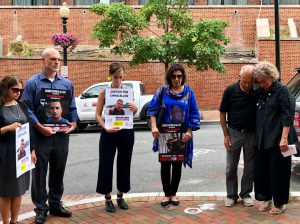Family, journalism community demand justice for journalist killed in South Sudan
WASHINGTON — The parents of Christopher Allen, a 26-year-old British-American freelance journalist killed while covering the civil war in South Sudan, said at a vigil Monday on the two-year anniversary of his death that the South Sudanese government should be forced to provide answers on how Allen died.
At the vigil outside the South Sudanese Embassy in D.C., organized by Reporters Sans Frontières, Amnesty International, Committee to Protect Journalists and PEN International, Joyce Krajian and John Allen said South Sudan has said “nothing” about how their son was killed and neither the U.S. nor the UK has been able to pressure South Sudan to investigate their son’s death.
“As far as we are aware, there has been no investigation, there has been no report, there has been no accountability,” Krajian said.
A vigil was also held in London.
Allen is the sixth journalist to be killed and the only international journalist to ever be killed in South Sudan. He was fatally shot on Aug. 26, 2017, when South Sudanese rebels attacked the town of Kaya near the Ugandan border. It remains unclear whether his death was targeted, but some suspect government troops killed him for photographing the conflict.
“We heard that he was initially in an ambush where 19 people were killed, and then we heard two people were killed, and everything in between,” she continued. “So was there an ambush? Were there people killed on both sides? We don’t think so. What we do believe is that Chris was killed because he had a camera in his hand.”

Krajian and her husband had monthly phone calls with the U.S. Embassy in South Sudan from June 2018 to February 2019, but with no new information uncovered. They also wrote to the South Sudanese foreign minister and president but received no response.
Allen’s parents said they spoke to alleged eye witnesses, but thel accounts were inconsistent. “Sometimes in the same conversation the story would change,” Krajian said.
The most conclusive report comes from a Mail and Guardian article, in which a sergeant with the government army who was present at the attack said the soldiers saw Allen taking pictures and thought he was “a white rebel that was filming.”
Krajian said their legal team in London has reason to believe that both Allen’s killing and the treatment of his body constitute war crimes.
Under international law, South Sudan is obligated to investigate Allen’s death as a possible war crime, explained Dokhi Fassihian, executive director of RSF North America.
“The answer that it’s a conflict zone and killings happen is not an answer,” she said.
John Allen said he wants those who ordered or did the killing to be brought to justice and sentenced for murder.
“In [Christopher’s] absence, we feel very committed to doing what he did with his life, which was to speak the truth and call for justice,” Krajian said.
Krajian said they are fighting to make sure governments know they cannot kill without consequences. “We want to make the world a safer place for other journalists.”


